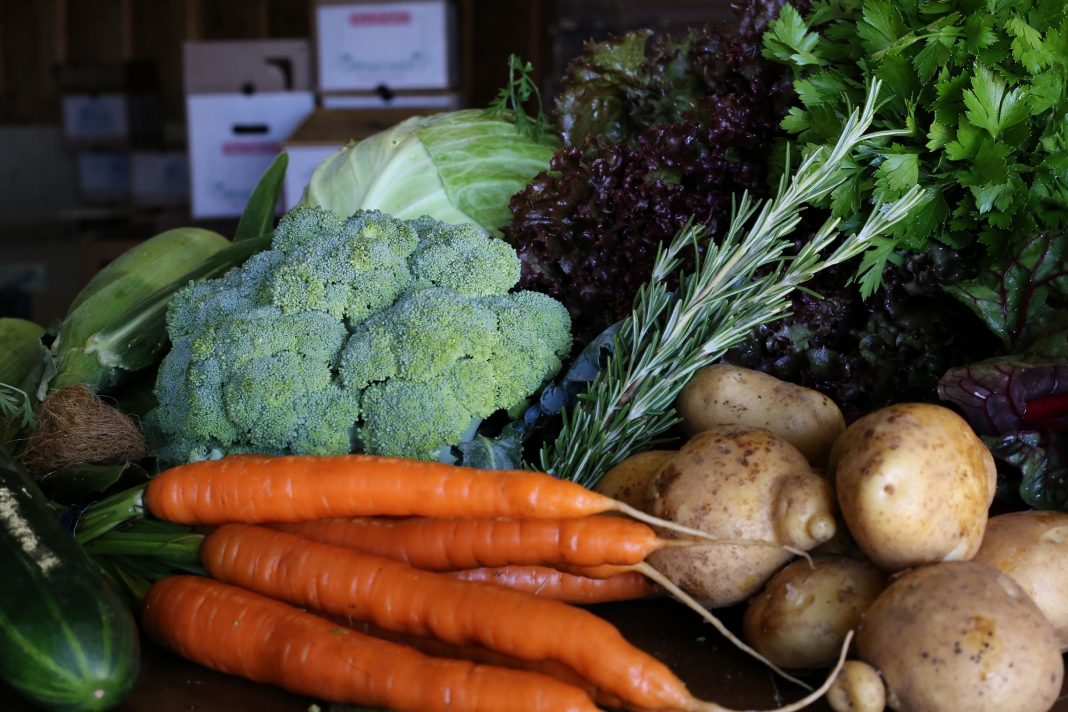Visiting a local farm stand or farmers market lets you put a face to a place to a taste, as it were. You meet the growers, crafters and artisans behind the produce, meat and locally sourced ingredients we use every day. But that’s not easy to do if you’re shopping for an entire school district, bustling hospital or local correctional facility. This is where the Southwest Washington Food Hub is vital. It provides one-stop-shopping for buyers large and small by uniting farmers across the region under one umbrella.
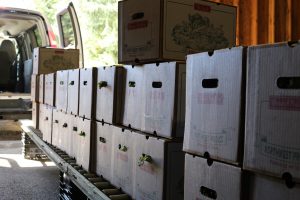
The newly kicked-off Food Hub, which is a farmer-owned cooperative, is a tremendous partnership between such organizations as the Port of Olympia, Thurston Economic Development Council (EDC), Thurston WSU Extension, Pacific Mountain Workforce Council, and Northwest Agriculture Business Center (NABC). But at the heart of it is our local farmers.
“Launching the Hub this summer was a COVID-19 response, helping farms remain viable businesses and increase revenues through development of new markets and expansion of distribution,” explains Aslan Meade of the Thurston Economic Development Council. “NABC had led some incredible work forming regional farmers into a grain grower’s cooperative. The Hub was able to piggyback on this work and all the farmers together are now part of the SW WA Growers Cooperative.”
Talk of putting together a hub-style way for farms to coordinate production and delivery, as well as marketing, ordering and payment has been going on for many years. In 2016, an agriculture producer needs assessment was conducted and market access was a key farmer request, says WSU Thurston County Extension Director, Stephen Bramwell. This equates to everything from more places for processing, packing, and dry, cold and frozen storage to getting the word out through collective marketing and consumer education & outreach.
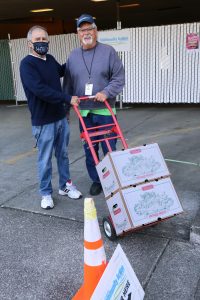
This type of product aggregation allows farmers to reach new, larger and geographically distant markets, says Bramwell, as well as have more control over wholesale pricing that has remained relatively unchanged for the last 20 years.
Though operations only started in September 2020, the Food Hub already passed $50,000 in sales, and has their first institutional account thanks to Providence St. Peter & Centralia Hospitals. Providence has made a commitment to supporting local farmers and providing fresh local ingredients for their patients and staff. Hospital foodservice managers are now able to shop through one point of purchase, receive one invoice, and pay through one portal for their delivery of farm-fresh food.
The Southwest Washington Food Hub is truly a team effort. Farmers provide a fresh sheet of what’s ripe and ready to the Hub’s general manager who then acts as a broker to local accounts. Sales are tallied then a pick-sheet is sent to each seller of what needs to be prepared for that week’s delivery. Items are then delivered to the Tumwater central warehouse, where it’s aggregated, before going on to their final destination. The warehouse is being provided to the co-op by the Port of Olympia as an in-kind contribution as the Port sees providing infrastructure to increase commerce as a community contribution which matches its mission.
Often, a key barrier to farms finding new clients is marketing. Bramwell cites a local WSU Farm-to-Market Assessment that found that 64% of participating farmers wanted to aggregate and jointly market products to fill in gaps, and reduce supply chain limitations. This allows for a steady stream of goods delivered with reliable consistency.
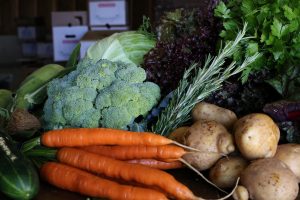
Genine Bradwin of Kirsop Farm is one of the farmer members of the Food Hub. “The new Southwest Growers Cooperative Food Hub provides us with a simple way to list what we have, in what quantities, at prices we set, and then wait for the Hub to collect orders and send us a pick ticket for one big order. This kind of efficiency will allow us to support deliveries to multiple stores and restaurants without taking the time to call each of them individually and then ask them to call us back, and then return their calls and finally make a deal, then pack and deliver all those small deliveries.”
“Any time we can make a choice to increase our income and decrease our expenses as a farm food business is a good idea. And it’s not just for us, but for all of the farmer members together, as well as our customers,” says Bradwin. “It is in the interest of everyone to see local food producers succeed and remain viable in our communities. We all need to eat.”
“The main takeaway is how beneficial this will be in the long run,” agrees Jim McGinn of Rising River Farm. He started researching—and keeping his ear to the ground about—food hubs in the early 2000s. “It just made too much sense to give up on it,” he says. “This type of project collectively inspires and is beneficial to all farmers in the region.”
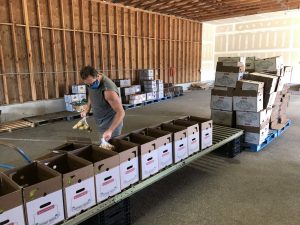
Photo courtesy: Southwest Washington Food Hub
And, he explains, having partners like the Port, EDC, and WSU “lends institutional support and credibility” when applying for grants or other ways to expand, fund and grow. The more farmers who enroll, he says, the more popular it will become as new and exciting items are added.
WSU’s Bramwell hopes that all farms and value-added producers will be encouraged to reach out and learn more about joining the Hub. Sustainable practices are encouraged, but both organic and conventionally produced items are welcome. Fruits, veggies, meat, grains, flours, packaged goods…they love it all. Simply email info@swwafoodhub.com to learn more.
It’s always nice to meet the tireless small business owners and regional farmers working behind the scenes. Partnerships like the Southwest Washington Food Hub do more than simply put food on your table, they keep our regional economy and local environment vibrant and healthy for generations to come. Whether you’re ordering by the box or by the bushel, add them to your list of one-stop-shopping favorites today. Olympia may be known for its water but this time it’s the food and the farmers who matter most.
Sponsored







































